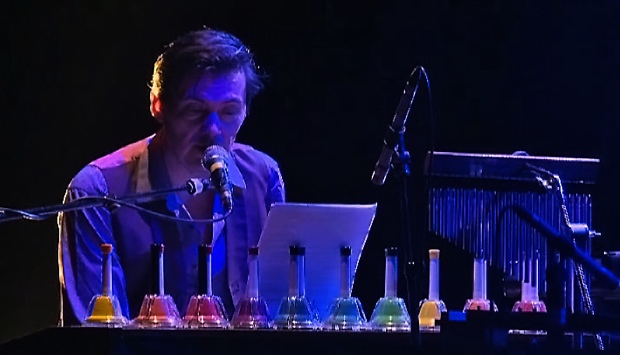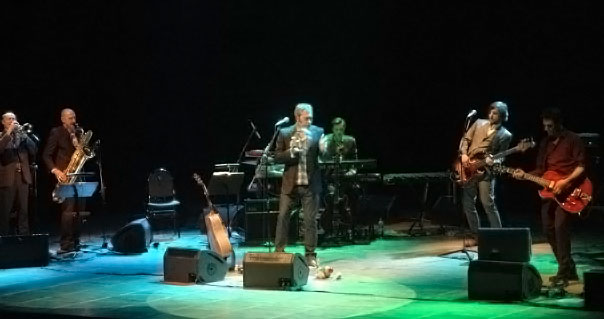Home » Jazz Articles » Catching Up With » David Boulter: Thinking Differently
David Boulter: Thinking Differently

Even later, the band's music stood apart from the then-current and ever-changing music trends. In February of this year, the band released The Something Rain (Constellation Records, 2012), an intriguing listen and artistic triumph. It is a kind of a record that sums up the best of the band as it builds on past successes and expands its ambitions. In 2011, Tindersticks released a box set of soundtrack music, Claire Denis: Film Scores 1996-2009 (Constellation Records, 2011), that the band has produced for acclaimed French director Claire Denis, and went on tour with it.
This interview with founding member/keyboardist David Boulter took place in Novi Sad, one of the cities on Tindersticks' tour, following a two-hour concert that exceeded all expectations.
All About Jazz: The new album, The Something Rain, is really a great record with plenty of great songs. The creative process behind it differed from the previous ones. How was this record conceived?
David Boulter: When we released our last album, Falling down a Mountain (Constellation Records, 2010), we felt really invigorated and refreshed from starting again as Tindersticks, as we had stopped for awhile. But it still felt a little like something similar to what we did before, whereas when we set out to do The Something Rain we definitely felt like there was a need to think about it in different ways, so we kind of started writing different songs and different ideas, and we bought old drum machines, old keyboards and just tried to start it from a different kind of direction. It wasn't like Stuart sitting and playing a song on acoustic guitar, and it wasn't based around a piano or a ballad or something. It was about different ideas and we tried to think about it in a more different way.
AAJ: What does this record say about the band? What sort of evolution of the band do you see with this record?
DB: I suppose the biggest thing is just enjoying it. We have found ourselves in a situation where, after 17 or 18 years of being on a record label, we were not on a record label anymore, so it kind of gave us a freedom to do something different. But, at the same time, it put us under a lot of pressure to come up with something that works without the safety net. If we had it we wouldn't be able to carry on. I think it made us want to challenge ourselves and push the music a bit more.
AAJ: Can you elaborate more on being challenged as the new record really sounds more bolder.
 DB: It is similar to doing soundtracks and making different things that push musical ideas, and trying not to just make songs that you think people will enjoy when they come to see you. You try to make something that satisfies and surprises yourself, something that doesn't feel you made before. That is the biggest challenge. It is always difficult, with someone like Stuart, who has a particular voice, so it is always going to be Tindersticks but we try just to think about the songs in a different way in terms of shapes and sounds.
DB: It is similar to doing soundtracks and making different things that push musical ideas, and trying not to just make songs that you think people will enjoy when they come to see you. You try to make something that satisfies and surprises yourself, something that doesn't feel you made before. That is the biggest challenge. It is always difficult, with someone like Stuart, who has a particular voice, so it is always going to be Tindersticks but we try just to think about the songs in a different way in terms of shapes and sounds. AAJ: How did songs like "Medicine" and "Chocolate" come about? What were some of the ideas behind them?
DB: "Chocolate" was an idea for a story that came very quickly. On our second album [Tinderstick II (Polygram, 1995)] I wrote a story called "My Sister," which Stuart read. This time it was another story that I did. I actually did a little demo and sent it to Stuart, and we thought this time it was best for me to just read it and stay with that. And I suppose it just came to that very quickly, as there was some space after our last album and I was thinking of maybe making some small EP to try doing a thing of my own. In the end, it kind of inspired Stuart to write a couple of songs, so we kind of got together for a few days and we had five or six songs and we said that this may be is a start of something bigger and may be the next LP we should think about. In bigger terms, we invited some more people from the band to do what we could, and we built on the songs and, after about eight days, altogether over a period of two or three months we had fifteen to sixteen songs. It kind of grew from there.
AAJ: Please talk about the working relationship the band has with French film director Claire Denis. For the last 10 years, the band has been doing soundtrack music for her films. Last year a box set with soundtracks was released and the band did some touring specifically to promote that.
DB: She is someone we met and was very inspired by the song "My Sister" to make a film called Nanette et Boni (1996), and she came to see us in Paris around the time of the second album and asked us if we would be interested in making some music or if she could use the music. I think as soon as we met her we kind of liked her and we realized, watching her films, that she makes movies in the same way we make music. It wasn't about trying to make an impressive movie that everyone would go and see and would make lots of money. It was about something inside of her that she needed to express, which is very similar to our music, and her films don't always make complete sense. They leave you wondering what is actually happening, which is very similar to our music. Sometimes it is very open to people to interpret the way they want to.

AAJ: To me, right from the very start the music of Tindersticks had innate cinematic qualities to it. Were you aware of that at the time?
DB: Yeah! That is why we wanted to do a soundtrack because people have mentioned it. Personally I was very interested in soundtracks and it affected the sounds we used on our first and second album, and ever since I've been taking a different approach to song structure—not just verse, chorus, guitars. I've been trying to find different colors in the music and different methods of making music work. The great thing about working with Claire is that you are allowed to make music you want, whereas making soundtracks for a big Hollywood producer they would tell you exactly what music they want and where; that is not the kind we are not interested in. It doesn't give you any space to express yourself. I don't think we felt the need to make any more soundtracks but it is good to work with somebody like Claire. who gives you a chance to do something different.
AAJ: How has that work on soundtracks influenced the band's regular song-based music?
DB: It is really good because quite often it falls between albums when you get dead space where you have just finished and you are thinking what to do next, and if Claire is making a film, it gives you a chance to experiment with different things. Like the soundtrack material we did recently it is really interesting because we kind of started in a kind of small way using a harmonium and a cello. Then we built this collage of sound where everybody was adding different things. You don't have to worry about making a song; it's more about making a piece of music. It is not really classical music or jazz, as it has structure that gives you great freedom.
AAJ: The band is currently on tour promoting The Something Rain. What will happen next, after the concerts are over?
DB: I suppose this year is kind of twenty years of Tindersticks, so we think for us it kind of started twenty years ago but I think we plan something for next year that celebrates that. This year is all about the album that just got released, and we are thinking about the celebration next year. Hopefully something else will grow then.
Selected Discography
Tindersticks, The Something Rain (Lucky Dog/City Slang/Constellation, 2012)
Tindersticks, Claire Denis Film Scores 1996-2009 (Constellation Records, 2011)
Tindersticks, Falling Down a Mountain (4AD/Constellation Records, 2010)
Tindersticks, The Hungry Saw (Beggars Banquet/Constellation Records, 2008)
Tindersticks, Waiting for the Moon (Beggars Banquet, 2003)
Tindersticks, Can Our Love... (Beggars Banquet, 2001)
Tindersticks, Simple Pleasure (Island Records, 1999)
Tindersticks, Curtains (This Way Up, 1997)
Tindersticks, Tindersticks (This Way Up, 1995)
Tindersticks, Tindersticks (This Way Up, 1993)
Photo Credits
All Photos: Courtesy of Tindersticks
< Previous
John Taylor: Giulia's Thursdays
Comments
About Tindersticks
Instrument: Band / ensemble / orchestra
Related Articles | Concerts | Albums | Photos | Similar ToTags
For the Love of Jazz
 All About Jazz has been a pillar of jazz since 1995, championing it as an art form and, more importantly, supporting the musicians who create it. Our enduring commitment has made "AAJ" one of the most culturally important websites of its kind, read by hundreds of thousands of fans, musicians and industry figures every month.
All About Jazz has been a pillar of jazz since 1995, championing it as an art form and, more importantly, supporting the musicians who create it. Our enduring commitment has made "AAJ" one of the most culturally important websites of its kind, read by hundreds of thousands of fans, musicians and industry figures every month.























